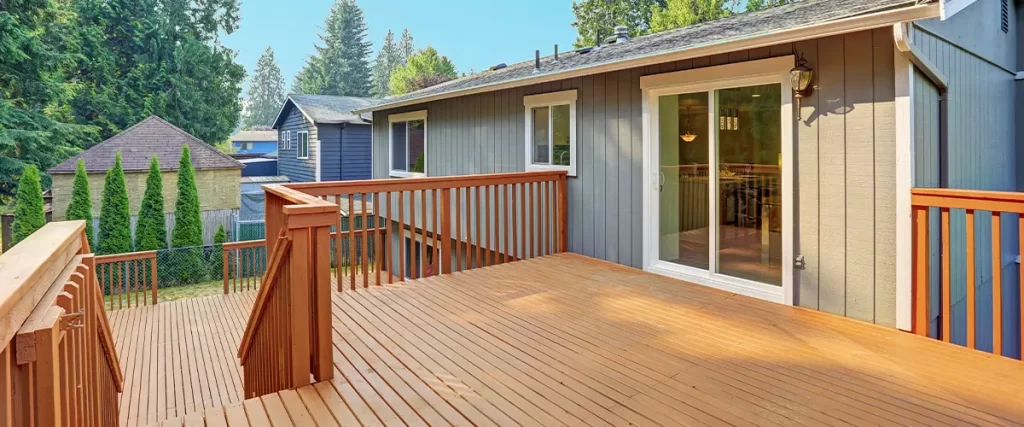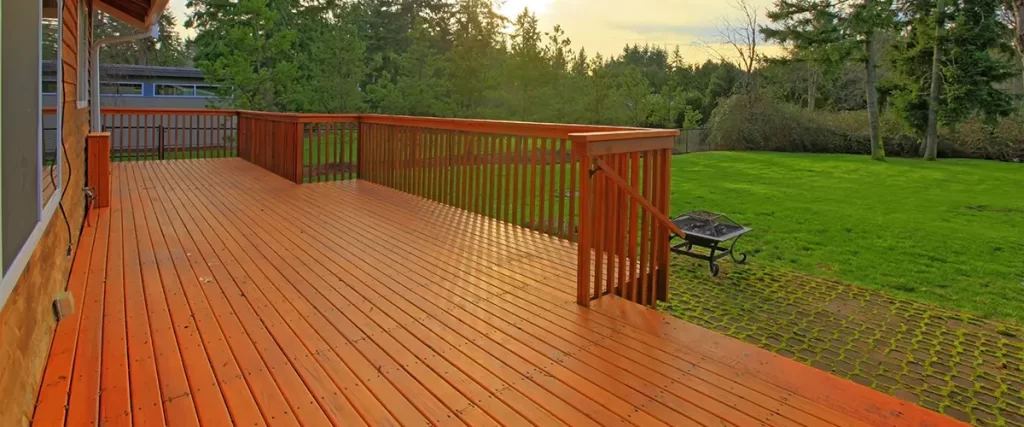A well-built wooden deck adds beauty and functionality to any home, but in Anne Arundel County, the warm, humid climate makes decks vulnerable to termites and wood-boring insects.
These pests can cause structural damage, leading to costly repairs or even replacement. Knowing how to prevent infestations and protect your deck ensures its longevity and keeps your outdoor space safe.

Signs of Termite & Wood-Boring Insect Damage
Termites and other pests often go unnoticed until significant damage has been done. Look for these common warning signs:
- Soft or hollow wood – If your deck boards sound hollow when tapped, termites may have eaten through the inside.
- Mud tubes – Subterranean termites build small, pencil-sized tubes along deck posts or foundations.
- Visible holes or sawdust – Wood-boring beetles and carpenter ants leave fine sawdust (frass) near exit holes.
- Buckling or warped boards – Infested wood loses its integrity and may shift or feel weak.
- Discarded wings – Swarming termites shed wings when they establish a colony near a food source.
Best Ways to Protect Your Deck from Termites & Insects
Choose the Right Decking Materials
Using the right pest-resistant materials can prevent insect damage before it starts.
| Material | Resistance to Insects | Maintenance Needs |
| Pressure-Treated Wood | Treated with chemicals to deter termites | Requires sealing and regular inspection |
| Composite Decking | Made from synthetic materials; termites can’t eat it | Low maintenance, but may need cleaning |
| Cedar & Redwood | Naturally insect-resistant oils | Needs regular staining and sealing |
| Tropical Hardwoods (Ipe, Mahogany) | Dense, hard wood that pests avoid | Expensive and requires special installation |
Apply Termite-Resistant Treatments
- Wood Sealants & Stains – Regularly apply sealant to create a moisture barrier that deters pests.
- Boric Acid & Insecticides – Treat deck posts and foundations to prevent infestation.
- Diatomaceous Earth – A natural solution that dehydrates and kills termites.
Keep Your Deck Dry & Well-Maintained
Moisture attracts termites and accelerates wood decay. Reduce risk by:
- Cleaning gutters and ensuring proper drainage around your deck.
- Removing fallen leaves and debris that trap moisture.
- Checking for water leaks and sealing any cracks in deck boards.
Inspect & Repair Damage Regularly
- Conduct a thorough deck inspection every six months.
- Replace rotted or compromised boards immediately.
- Ensure deck footings and support beams are not touching the soil directly.
Best Manufacturers for Termite-Resistant Decking
Using high-quality materials reduces the likelihood of termite and insect damage.
- Trex – Offers composite decking that is pest-proof and moisture-resistant.
- TimberTech – Provides durable, insect-resistant PVC and composite decking.
- Fiberon – Features high-performance materials that resist rot, decay, and pests.
- MoistureShield – Engineered for humid and damp environments, reducing the risk of termite damage.
- Ipe Woods USA – Supplies naturally insect-resistant tropical hardwoods.
FAQ: Termite & Wood-Boring Insect Protection for Decks
How often should I inspect my deck for termite damage?
At least twice a year, especially in spring and fall when termites are most active.
Can I prevent termites without using chemicals?
Yes! Composite decking, cedar, and tropical hardwoods naturally deter termites. Keeping your deck dry also helps.
Are termites a bigger problem in Anne Arundel County?
Yes, the humid climate and wooded areas create ideal conditions for subterranean termites and carpenter ants.
Do wood-boring beetles damage decks as badly as termites?
They can! While termites eat the wood, wood-boring beetles lay eggs inside, and their larvae tunnel through over time.
Should I replace a deck that has termite damage?
Minor damage can be repaired, but if the support structure is compromised, replacement may be necessary.
What’s the best termite treatment for wood decks?
Use a borate-based wood treatment or professional-grade insecticides to protect untreated wood.
Will sealing my deck prevent termites?
Yes, sealing reduces moisture retention, making wood less attractive to termites and preventing decay.
Is composite decking completely termite-proof?
Yes, termites cannot eat composite decking, making it a great choice for pest-prone areas.

Final Thoughts: Keeping Your Deck Pest-Free Year-Round
Protecting your deck from termites and wood-boring insects in Anne Arundel County requires proactive maintenance, quality materials, and regular inspections.
Whether you’re building a new deck or maintaining an existing one, choosing insect-resistant materials, sealing wood, and reducing moisture can help extend the life of your outdoor space.
If you need professional deck inspection, treatment, or repairs, contact us at (443) 926-6996 today for expert solutions that keep your deck safe and long-lasting.
